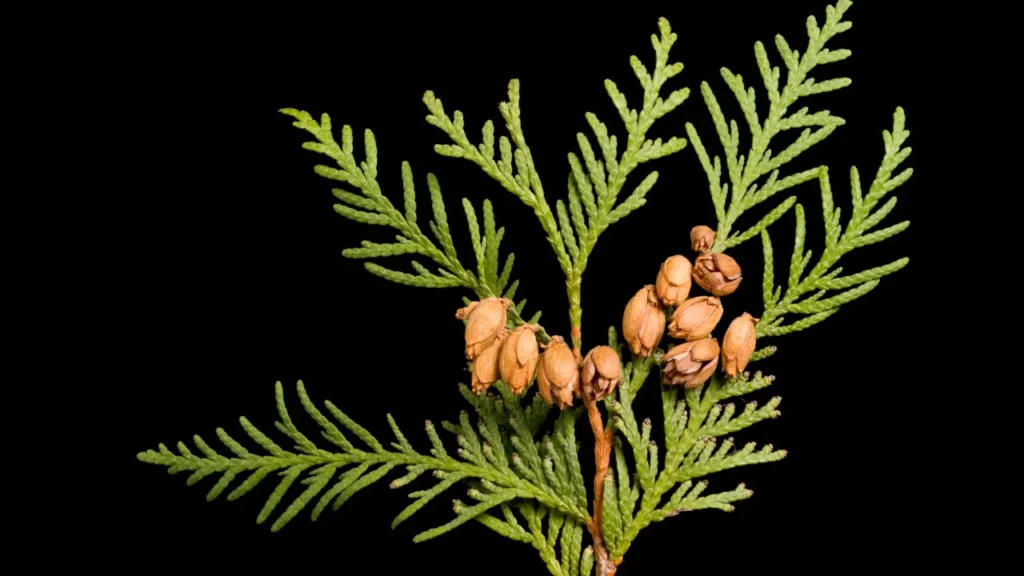The genus Thuja comprises coniferous trees of the Cupressaceae (cypress) family. This genus of trees is garnering scientific attention because its diverse phytochemical composition. There is also attention due to possible advantages for health, specifically in the area of cognitive enhancement. The nootropic properties of Thuja, particularly those related to alertness, focus, and cognition, are especially appealing. Thuja has been traditionally used in homeopathy and herbal medicine for a variety of diseases. The nature of Thuja, its health advantages, the appropriate dosage, any adverse effects, any drug interactions, and the best ways to utilize it responsibly as a nootropic supplement are all covered in this article.
You May Also Like:
What Are the Best Mushrooms for Brain Health? Here Are the Facts.
Dr Emil Nutrition Lion’s Mane Reviewed: A Leading Nootropic Mushroom Product
Thuja: Benefits, Dosage, Side Effects, Drug Interactions, and Other Important Information is an original (NootropicsPlanet) article.
Nature of Thuja
Thuja, also called cedar, is the collective name for a family of evergreen trees and shrubs that are prized for their aromatic wood and unique foliage. These plants, which are native to Asia and North America, have long been prized for their therapeutic qualities as well as for useful applications in woodworking. The concentration of Thuja’s bioactive chemicals is highest in its leaves and twigs, which are rich in essential oils. These qualities may explain why nootropic researchers are focusing on Thuja and its possible health benefits. Thuja has long been used in traditional medicine, with uses ranging from topical treatments for skin diseases to respiratory disorders, demonstrating the plant’s adaptability and the variety of phytochemicals it contains.
Health Benefits of Thuja
The possible health benefits of Thuja for the brain are numerous and include support for mental health, neuroprotection, and cognitive enhancement. Its wide range of complex phytochemicals, such as flavonoids, tannins, and thujone, which interact with different biological processes to enhance brain function, are mainly responsible for these effects.
Cognitive Enhancement
Improved cognitive abilities, such as increased focus, memory, and alertness, may be expedited by Thuja. The GABAergic system in particular is one of the neurotransmitter systems that are modulated in this process. Thuja can alter cognitive functions and neuronal excitability by affecting GABA receptors. This modulation contributes to the preservation of healthy neuronal activity, which may improve cognitive function, including focus and quick information processing. Moreover, Thuja’s chemical components may shield neurons from oxidative stress and inflammation through their anti-inflammatory and antioxidant qualities, hence enhancing cognitive performance.
Neuroprotection
Thuja potentially has positive effects on brain health attributed to its essential neuroprotective qualities. Its phytochemicals include antioxidant qualities that can help reduce oxidative stress. Thuja prevents oxidative damage to neurons and the cognitive decline that comes with aging as well as neurodegenerative illnesses like Parkinson’s and Alzheimer’s by scavenging free radicals. Furthermore, neuroinflammation is connected to a number of medical disorders that affect the brain, and Thuja’s anti-inflammatory properties could serve as help lessen that.
Support for Mental Health
Additionally, Thuja’s ability to reduce stress and possibly even treat mood disorders may present mental health benefits. Anxiolytic effects include lowering anxiety levels and promoting a feeling of peace and well-being through GABAergic system regulation. While more research is needed to fully understand Thuja’s direct impact on mood disorders including depression, its ability to reduce stress and anxiety may have a positive effect for those who suffer from these problems.

Chemistry of Thuja
Thuja contains a wide variety of bioactive chemicals that contribute to its therapeutic effects. Thujone stands out among these because of its effects on the central nervous system. A monoterpene belonging to the ketone family, thujone has therapeutic properties and can be found in a number of plants. In addition to thujone, Thuja is an abundant source of flavonoids, tannins, and volatile oils, all of which contribute in different ways to its medicinal properties. Together, these substances provide Thuja its anti-inflammatory, antioxidant, and perhaps neuroprotective qualities.
Physiological Mechanism of Action
Thuja’s effects on human physiology, especially as a nootropic, are mainly ascribed to thujone’s effects on the neurotransmitter systems of the brain. The brain’s GABA (gamma-aminobutyric acid) receptors, which are essential for reducing nerve activity, are impacted by thujone. Thuja may change neuronal excitability and affect cognitive processes like focus, memory, and alertness by modifying GABAergic transmission. Further supporting Thuja’s potential as a cognitive enhancer are the anti-inflammatory and antioxidant qualities of its other phytochemicals.


Optimal Dosage of Thuja
Because of the lack of large-scale clinical research and the heterogeneity of individual responses, it is difficult for a general consensus to determine the ideal dosage of Thuja for nootropic purposes. Low to moderate dosages may improve cognitive function while lowering the possibility of negative side effects, according to the existing traditional usage and sparse research. Be careful when using Thuja; large dosages of its main ingredient, thujone, can be neurotoxic. Before beginning any supplement program, it is advisable for you to speak with a healthcare provider to determine the proper dosage depending on your goals and current health status.
Side Effects of Thuja
Although Thuja may provide some health benefits, there are also negative effects and safety issues to be aware of. Thujone can result in convulsions, muscular spasms, and potentially hepatic or renal damage at higher dosages. Headaches, dizziness, and gastrointestinal disturbances are common adverse effects at lower doses. Thuja has strong biological activity and should be taken cautiously, especially in women who are pregnant or nursing, since it may have emmenagogue and abortifacient effects.
Potential Substance Interactions
The effects of Thuja may be amplified or lessened by its interaction with other substances, especially those that affect the central nervous system. For example, sedation and central nervous system depression may be more likely when Thuja is taken with other GABAergic medications. In a similar vein, using it in conjunction with stimulants or nootropics may have unpredictable results for alertness and cognitive function. A thorough comprehension by potential consumers of possible interactions is necessary for the safe administration of Thuja as a nootropic supplement.


Responsible Use and Considerations
Those of you who wish to investigate the cognitive advantages of Thuja must utilize it responsibly. This entails following the suggested dosages, being informed of any possible interactions and adverse effects, as well as keeping an eye on how the supplement is making you feel. Crucially, people should place a high priority on a comprehensive strategy for improving cognitive function, taking into account lifestyle elements like nutrition, exercise, and sleep, all of which are vital for brain health.
Moreover, one should not undervalue the source and quality of supplements containing Thuja. Purchasing products from reliable vendors will guarantee their effectiveness and purity while lowering the possibility of cross-contamination with dangerous materials.
Conclusion:
Thuja
Thuja has potential health benefits for the brain, but because of possible adverse effects and the possibility of toxicity at large doses, it is important to use caution when using it. The existing body of knowledge regarding Thuja’s effects on mental and cognitive health is founded on its well-established pharmacological characteristics and historical application.
However, more in-depth clinical investigations and studies are required to completely clarify its modes of action. Hopefully in time, subsequent studies will provide a more comprehensive depiction of the safe and efficacious utilization of Thuja to bolster brain well-being. In the meantime, there is a long history of Thuja used in a variety of products, including supplements, where the effects have been safe, soothing, and nourishing.


References:
- “Thuja occidentalis (Arbor vitae): A Review of its Pharmaceutical, Pharmacological and Clinical Properties.” Retrieved from: https://www.ncbi.nlm.nih.gov/pmc/articles/PMC1062158/
- “Thuja – Uses, Side Effects, and More.” Retrieved from: https://www.webmd.com/vitamins/ai/ingredientmono-1117/Thuja
- “Thuja.” Retrieved from: https://www.sciencedirect.com/topics/pharmacology-toxicology-and-pharmaceutical-science/Thuja
Important Note: The information contained in this article is for general informational purposes only, and should not be construed as health or medical advice, nor is it intended to diagnose, prevent, treat, or cure any disease or health condition. Before embarking on any diet, fitness regimen, or program of nutritional supplementation, it is advisable to consult your healthcare professional in order to determine its safety and probable efficacy in terms of your individual state of health.
Regarding Nutritional Supplements Or Other Non-Prescription Health Products: If any nutritional supplements or other non-prescription health products are mentioned in the foregoing article, any claims or statements made about them have not been evaluated by the U.S. Food and Drug Administration, and such nutritional supplements or other health products are not intended to diagnose, treat, cure, or prevent any disease.
